2005 年湖北大学考博英语真题
(总分 100, 考试时间 90 分钟)
Part Ⅰ Reading Comprehension
Directions: There are 4 reading passages in this part. Each passage is followed by some questions
or unfinished statements. For each of them there are four choices marked A, B, C, and D. You should
decide on the best choice and mark your answer on the ANSWER SHEET by blackening the corresponding
letter in the brackets.
Today, a high-level finance manager is just as likely to be a casual-looking 21-year-old as a
balding executive. They have all either started their own companies or head a division within an
existing firm. Most are under 30.
Many of them share a tendency to think, speak and act fast. A detailed psychological study carried
out recently on young business start-uppers aged over 25 revealed some common characteristics.
The head psychologist at the University of Northumbria, Dr. Martyn Dyer-Smith, says "We found
that they are opportunists. They have that entrepreneurial ability to take whatever is in front of
them and turn it to their advantage. Any fool can make US $ 2 if they are in the right place at the
right time, what is much harder is to actually plan their business. Originally I had a hypothesis
that they planned a long time ahead, but I was wrong. What came across was a surprisingly short planning
time. They took the opportunities as and when they came up."
What cannot be underestimated, though, is self-confidence.
"There is an amazing, almost abnormal, belief in themselves and (they) go very much on intuition."
Says Dyer-Smith.
While there is no typical pattern to what puts someone in the fast lane, there are some common
threads: living up to the expectations of parents, channeling excessive amounts of energy into
business, or finding a way to overcome personal barriers such as dyslexia (a reading disability) or
learning difficulties, for example.
The biggest surprise was the lack of young women. This was particularly unexpected, given the
recent publicity about how girls are performing better than boys at school and becoming more confident
and ambitious.
But young women are opting for more secure careers rather than gambling with their future. With
only a handful of female role models, some girls are not even considering being their own boss, let
alone working on a concept fresh out of school, according to Dr Susan Vinnicombe, director of the
center for the Development of Women Business Leader. "Women are going more into the corporate structure
and doing well there. But perhaps the reason that they are not doing business for themselves at an
earlier age is because women's attitudes are different. They perceive risk in a different way to men,
who are not worried about borrowing huge amounts of money if it's going to help their business in
the long term. Women are more cautious and more hesitant ," she says.
Vinnicombe sees the lack of female entrepreneurs as part of a larger problem about women and
the IT industry. Given that the computer world is one of the key areas for growth, where youth is
an asset, it is "remarkable" that so many women are missing out on it.
"The number of women in IT has actually dropped in the past 10 years. There is a real problem
with attracting them to the IT industry, as girls don't seem to want to do it at university. It's
become such a worrying issue that I know the government is looking into ways to attract them."
1.
What is the passage mainly about?
A
B
C
D
Lack of young managers all over the world.
Features of high-level finance managers.
Origins of the decline in female-dominated industry.
Aims of a young woman fresh out of school.
�
2.
Which of the following does not account for the success of the young businessmen?
A
B
C
D
They never hesitate to take full advantage of the approaching opportunities.
They have a strong confidence in their own abilities.
They often base their work on long-term planning.
They deal well with their personal advantages.
3.
What is suggested as a reason for the shortage of business women?
A
B
C
D
Girls do not perform so well as boys at school.
Most companies are reluctant to employ women.
Banks often refuse to give women large loans.
Women are very worried about the risk-taking in their careers.
4.
From the text we can learn that ______.
A
B
C
D
some managers are very young but already have their own business.
some managers are as casual and irresponsible as energetic young people.
the government is concerned about the lack of women in such a field as IT.
IT remains a minor area for growth.
5.
The passage shows that the author is ______ the present situation.
A
B
C
D
critical of
amazed at
disappointed at
puzzled by
Once upon a time, innovation at Procter & Gamble flowed one way: from the United States outward.
While the large Cincinnati-based corporation was no stranger to foreign markets, it usually sold them
products that were already familiar to most Americans. Many Japanese families, for instance, swaddle
their babies in Pampers diapers, and lots of Venezuelans brush their teeth with Crest. And of course
(company executive assumed) American at home wanted these same familiar, red-white and blue brands.
We might buy foreign-made cars, or chocolates, or cameras but household cleaners and detergents?
Recently, however, P&G broke with this long-standing tradition. Ariel, a P&G laundry detergent,
was born overseas, and is a familiar sight on store shelves in Europe and Latin America. Now bilingual
packages of Ariel Ultra, a super-concentrated cleaner, are appearing on supermarket shelves in Los
Angeles.
Ariel's appearance in the United States reflects demographic changes making Hispanics the
nation's fastest-growing ethnic group. Ariel is a hit with this population. In fact, many Mexican
immigrants living in Southern California have been "importing" Ariel from Tijuana, Mexico. "Hispanics
knew this product and wanted it," says P&G spokeswoman Marie Salvado. "We realized that we couldn't
convince them to buy (our) other laundry detergents." P&G hopes that non-Hispanic consumers will give
Ariel a try too.
Ariel's already strong presence in Europe may provide a springboard for the company to expand
into other markets as well. Recently P&G bought Rakona, Czechoslovakia's top detergent maker. Ariel,
currently a top seller in Germany, is likely to be one of the first new brands to appear in Czech
supermarkets. And Ariel is not the only foreign idea that the company hopes to transplant back to
its home territory. Chinch, an all-purpose spray cleaner similar to popular European products, is
currently being test-marketed in California and Arizona. Traditionally Americans have used separate
cleaners for different types of surfaces, but market research shows that American preferences are
becoming more like those in other countries.
Insiders note that this new reverse flow of innovation reflects more sweeping changes at Procter
�
& Gamble. The firm has hired many new Japanese, German, and Mexican managers who view P&G's business
not as a one-way flow of American ideas, but a two-way exchange with other markets. Says Bonita Austin
of the investment firm Wertheim-Schroeder, "When you met with P&G's top managers years ago, you wouldn't
have seen a single foreign face." Today "they could even be in the majority."
As Procter & Gamble has found, the United States is no longer an isolated market. Americans are
more open than ever before to buying foreign-made products and to selling U. S.-made products overseas.
The brands of Pampers, Crest, Ariel, and Cinch reflect the traditional one-way flow of Procter
In spite of market changes, Procter & Gamble still sticks to its long-standing tradition of one-way
6.
According to the passage, which of the following is true?
A
& Gamble.
B
flow innovation.
C
its foreign managers.
D
Today one may meet more foreign faces in Procter & Gamble than years ago.
Procter & Gamble has to change its one-way flow tradition because of the increased
number of
7.
According to the passage, all of the following are true about Ariel except ______.
A
B
C
D
it is the best seller in Czechoslovakia
it is a laundry detergent product of Procter & Gamble
Ariel was born outside the United States
it already enjoys popularity in Europe
8.
The "insider" (paragraph 5, line 1) is most probably ______.
A
B
C
D
someone who buys both Ariel and Cinch
someone who works within Procter & Gamble or knows it fairly well
someone who is a loyal customer of Ariel
someone once worked within Rakona
9.
According to the passage, Procter & Gamble hopes to transplant the foreign idea back to its home
territory because ______.
A
B
C
D
Americans are more likely to buy foreign-made products than before
for most Americans foreign products are much more attractive than home-made ones
the company has found that foreign-made products are superior to home-made ones in terms of quality
the company has hired more foreigners in its top management than before
10.
The author may most probably agree that ______.
it is a trend that businesses today go global
A
B
businesses today are very reluctant to go global
American businesses can make more money if they only sell home-made products
C
D
the market of the United States should not be that open
The climate of Earth is changing. Climatologists are confident that over the past century, the
global average surface temperature has increased by about half a degree Celsius. This warming is thought
to be at least partly the result of human activities, such as the burning of fossil fuels and the
clearing of forests for agriculture. As the global population grows and national economies expand,
the global average temperature is expected to continue increasing by an additional 1.0 to 3.5℃ by
the year 2100.
Climate change is one of the most important environmental issues facing humankind. Understanding
the potential impacts of climate change for natural ecosystems is essential if we are going to manage
�
our environment to minimize the negative consequences of climate change and maximize the opportunities
that it may offer. Because natural ecosystems are complex, nonlinear systems, it follows that their
responses to climate change are likely to be complex. Climate change may affect natural ecosystems
in a variety of ways. In the short term, climate change can alter the mix of plant species in land
ecosystems such as grasslands. In the long term, climate change has the potential to dramatically
alter the geographic distribution of major vegetation types--savannas, forests, and tundra. Climate
change can also potentially alter global ecosystem processes, including the cycling of carbon,
nitrogen, phosphorus, and sulfur. Moreover, changes in these ecosystem processes can affect and be
affected by changes in the plant species of the ecosystem and vegetation type. All of the climate
change-induced alterations of natural ecosystems affect the services that these ecosystems provide
to humans.
The global average surface temperature increase of half a degree Celsius observed over the past
century has been in part due to differential changes in daily maximum and minimum temperatures,
resulting in a narrowing of the diurnal temperature range. Decreases in the diurnal temperature range
were first identified in the United States, where large-area trends showed that maximum temperatures
have remained constant or increased only slightly, whereas minimum temperature have increased at a
faster rate. In this issue, Alward et al. report on the different sensitivities of rangeland plants
to minimum temperatures increases.
11.
Which of the following is NOT mentioned as a reason for the global warming?
A
B
C
D
The burning of fuels such as coal or oil.
The clearing of forests.
The cultivation of farmland.
The negative consequences of human activities.
12.
The second paragraph is primarily concerned with ______.
A
B
C
D
the potential impacts of climate change for natural ecosystems
how to minimize the negative consequences of climate change
how to maximize the opportunities that climate change may offer
the complex, nonlinear nature of natural ecosystems
13.
According to the author, what may chiefly be responsible for the temperature increases ______ observed
over the past century?
A
B
C
D
Increases of daily maximum temperatures.
Decreases of daily minimum temperatures.
Increases of diurnal temperature range.
Decreases in the diurnal temperature range.
14.
In subsequent paragraphs, we may expect the writer of this passage to ______.
A
B
C
temperatures increases
D
discuss the global impacts of temperatures increases
present a point of view which supports the idea of the second paragraph
introduce Alward's report on the different sensitivities of rangeland plants to minimum
further illustrate the causes of the global average surface temperature increases
15.
The word "diurnal" (in Paragraph 3) is closest in meaning to ______.
A
B
day-and-night's
everyday
�
C
D
two days'
yearly
The most damning thing that can be said about the world's hest-endowed and richest country is
that it is not only not the leader in health status, but that it is so low in the ranks of the nations.
The United States ranks 18th among nations of the world in male life expectancy at birth, 9th in female
life expectancy at birth, and 12th in infant mortality. More importantly, huge variations are evident
in health status in the United States from one place to the next and from one group to the next.
The forces that affect health can be aggregated into four groupings that lends to analysis of
all health problems. Clearly the largest aggregate of forces resides in the person's environment.
His own behavior, in part derived from his experiences with his environment, is the next greatest
force affecting his health. Medical care services, treated as separate from other environmental factors
because of the special interest we have in them, make a modest contribution to health status. Finally
the contributions of heredity to health are difficult to judge. We are templated at conception as
to our basic weaknesses and strengths, but many hereditary attributes never become manifest because
of environmental and behavioral forces which act before the genetic forces come to maturity, and other
hereditary attributes are increasingly being palliated by medical care.
No other country spends what we do per capita for medical care. The care available is among the
best technically, even if used too lavishly and thus dangerously, but none of the countries which
stand above us in health status have such a high proportion of medically disenfranchised persons.
Given the evidence that medical care is not that valuable and access to care not that bad, it seems
most unlikely that our bad showing is caused by the significant proportion who are poorly served.
Other hypotheses have greater explanatory power: excessive poverty, both actual and relative, and
excessive affluence.
Excessive poverty is probably more prevalent in the U.S. than in any of the countries that have
a better infant mortality rate and female life expectancy at birth. This is probably true also for
all but four or five of the countries with a longer male life expectancy. In the notably poor countries
that exceed us in male survival, difficult living conditions are a more accepted way of life and in
several of them, a good basic diet, basic medical care and basic education, and lifelong employment
opportunities are an everyday fact of life. In the U. S. a national unemployment level of 10 percent
may be 40 percent in the ghetto(黑人居住地) while less than 4 percent elsewhere. The countries that
have surpassed us in health do not have such severe or entrenched problems. Nor are such a high
proportion of their people involved in them.
Excessive affluence is not so obvious a cause of ill health, but, at least until recently, few
other nations could afford such unhealthful ways of living. Excessive intake of animal protein and
fats, dangerous imbibing of alcohol and use of tobacco and drugs (prescribed and proscribed), and
dangerous recreational sports and driving habits are all possible only because of affluence. Our
heritage, desires, opportunities, and our machismo, combined with the relatively low cost of bad foods
and speedy vehicles, make us particularly vulnerable to our affluence. And those who are not affluent
try harder. Our unacceptable health status, then, will not be improved appreciably by expanded medical
resources nor by their redistribution so much as by a general attempt to improve the quality of life
for all.
16.
All of the following are mentioned in the passage as factors affecting the health of the population
EXCEPT ______.
A
B
C
D
the availability of medical care services
the genetic endowment of individuals
the nation's relative position in health status
an individual's own behavior
17.
The author is primarily concerned with ______.
A
condemning the U.S. for its failure to provide better medical care to the poor
�
B
S.
C
D
evaluating the relative significance of factors contributing to the poor health status in the U.
providing information which the reader can use to improve his or her personal health
comparing the health status of the U.S. population with that of the world averages
18.
The author refers to excessive intake of alcohol and tobacco and drug use in order to ______.
A
B
C
D
show that some health problems cannot be attacked by better medical care
demonstrate that use of tobacco and intoxicants is detrimental care
cite examples of individual behavior which have adverse consequences for health status
illustrate ways in which affluence may contribute to poor health status
19.
In discussing the forces that influence health, the author implies that medical care services are
______.
A
B
C
D
the least important of all
a special aspect of an individual's environment
a function of an individual's behavior pattern
becoming less important as technology improves
Listings of the most common causes of death among male and female adults.
Suggestions for detailed proposals to improve the quality of life.
A study of the over-crowding in urban hospitals in America.
An explanation of the causes for poverty in America.
20.
What will most probably follow this passage?
A
B
C
D
Part Ⅱ Vocabulary
Directions: There are 30 incomplete sentences in this part. For each sentence there are four choices
marked A, B, C, and D. Choose the ONE that best completes the sentence and then mark your answer on
the ANSWER SHEET by blackening the corresponding letter in the brackets.
21.
The poor reception on your TV is probably due to outside ______.
intervention
interruption
interception
interference
A
B
C
D
22.
He couldn't explain the problem well, as he had only a(n) ______ knowledge of the subiect.
elementary
rudimentary
inceptive
initial
A
B
C
D
23.
Although Lucy was slimming, she found cakes quite ______.
irremovable
irresistible
irrefutable
irrepressible
A
B
C
D
24.
The border incident led to the two countries ______ diplomatic relations.
�
breaking off
breaking up
cutting off
cutting up
A
B
C
D
25.
The conditions can be well imagined when one small settlement is expected to ______ 10,000 families.
populate
dwell
house
reside
A
B
C
D
26.
The completion of the new Town Hall has been ______ owing to a strike.
held on
held up
held down
held off
A
B
C
D
27.
Wolves are said to howl at the moon when it is ______.
round
complete
full
whole
A
B
C
D
28.
The teacher was ______ both in his marking of homework and also in his treatment of offenders.
merciful
forgiving
pitiful
lenient
A
B
C
D
29.
We shall have to ______ if we want to go to Florida this summer.
lay up
save up
make off
put away
A
B
C
D
30.
They are always ready to ______ heavy responsibilities.
take in
take on
put on
put in
A
B
C
D
31.
I've told you ______ that you cannot to out and play until you've finished your homework.
A
B
C
once and for all
to all intents and purposes
all the way
�
in all respects
D
32.
He reminded me of what I should ______ have forgotten.
moreover
otherwise
nevertheless
notwithstanding
A
B
C
D
33.
Directly he saw her, he fell ______ in love.
from head to foot
head over heels
head and shoulders
toe to toe
A
B
C
D
34.
Charles Ⅱ was another monarch ______ maligned by Victorian historians.
much
very
greatly
deeply
A
B
C
D
35.
We have to ______ our hope of reaching the production target this year.
A
B
C
D
36.
Urban congestion would be greatly relieved if only the ______ charged on public transport were more
reasonable.
release
retract
resign
abandon
prices
tickets
fees
tariffs
A
B
C
D
37.
We're ______ by mosquitoes up here in the north in summer.
A. infested
B. infected
C, swarmed
D.
plagued
38.
Henry's news report covering the conference was so ______ that nothing had been omitted.
understanding
comprehensible
comprehensive
understandable
A
B
C
D
39.
Some television programs have to be fundamentally changed on account of an industrial ______.
A
B
C
row
affray
dispute
�
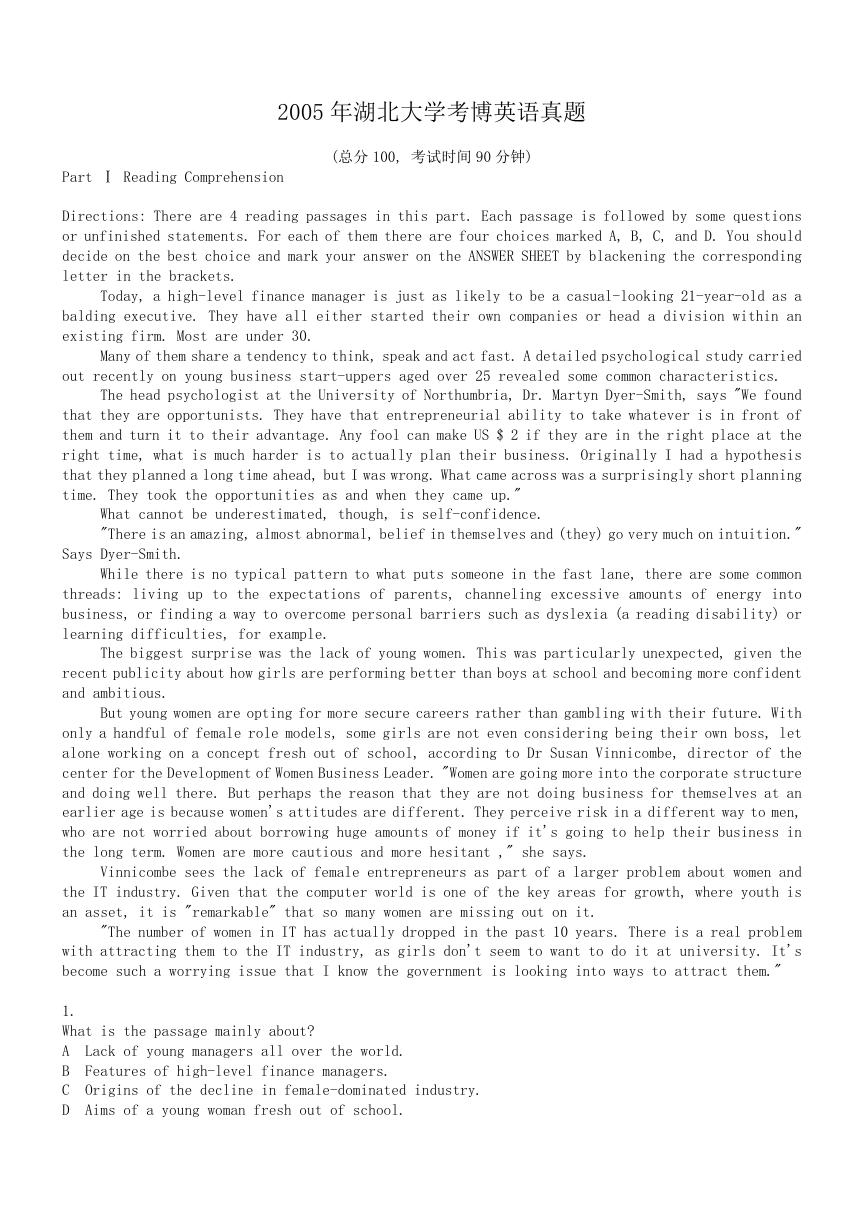
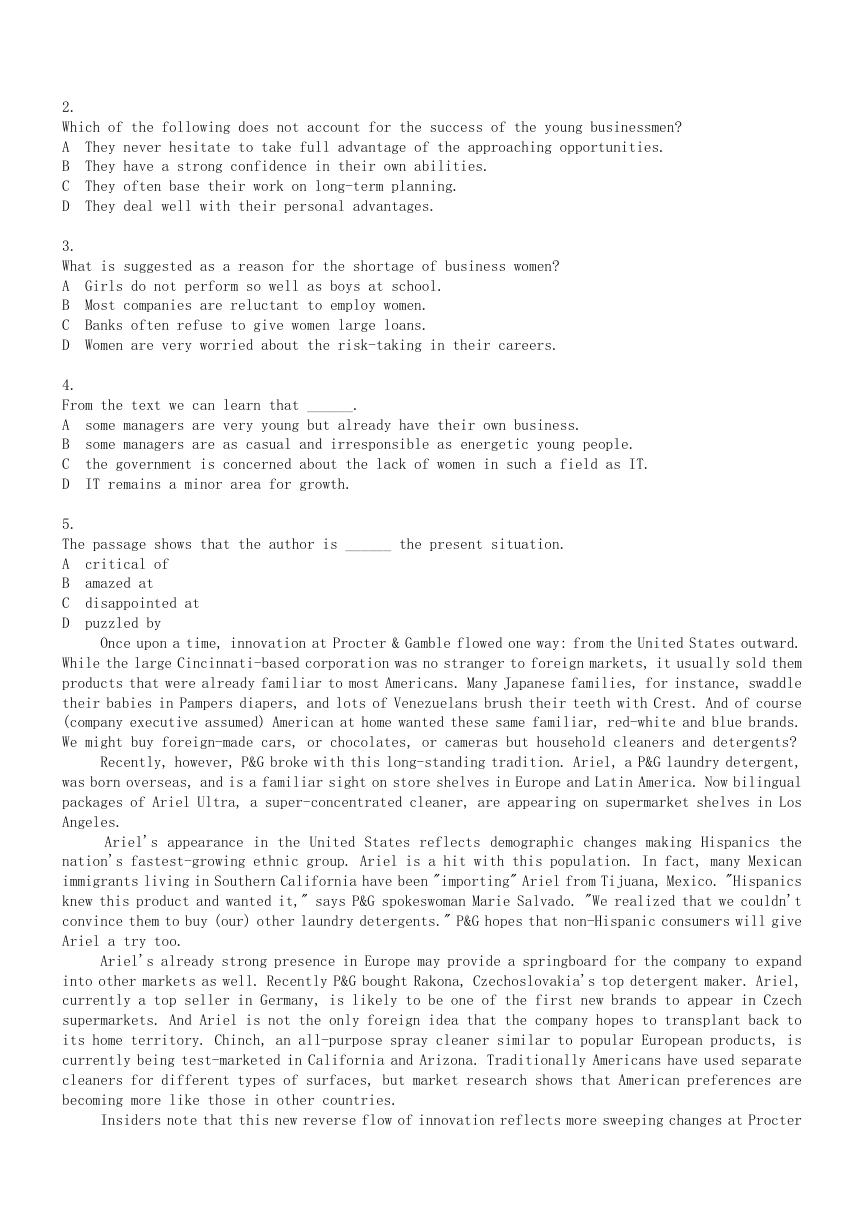
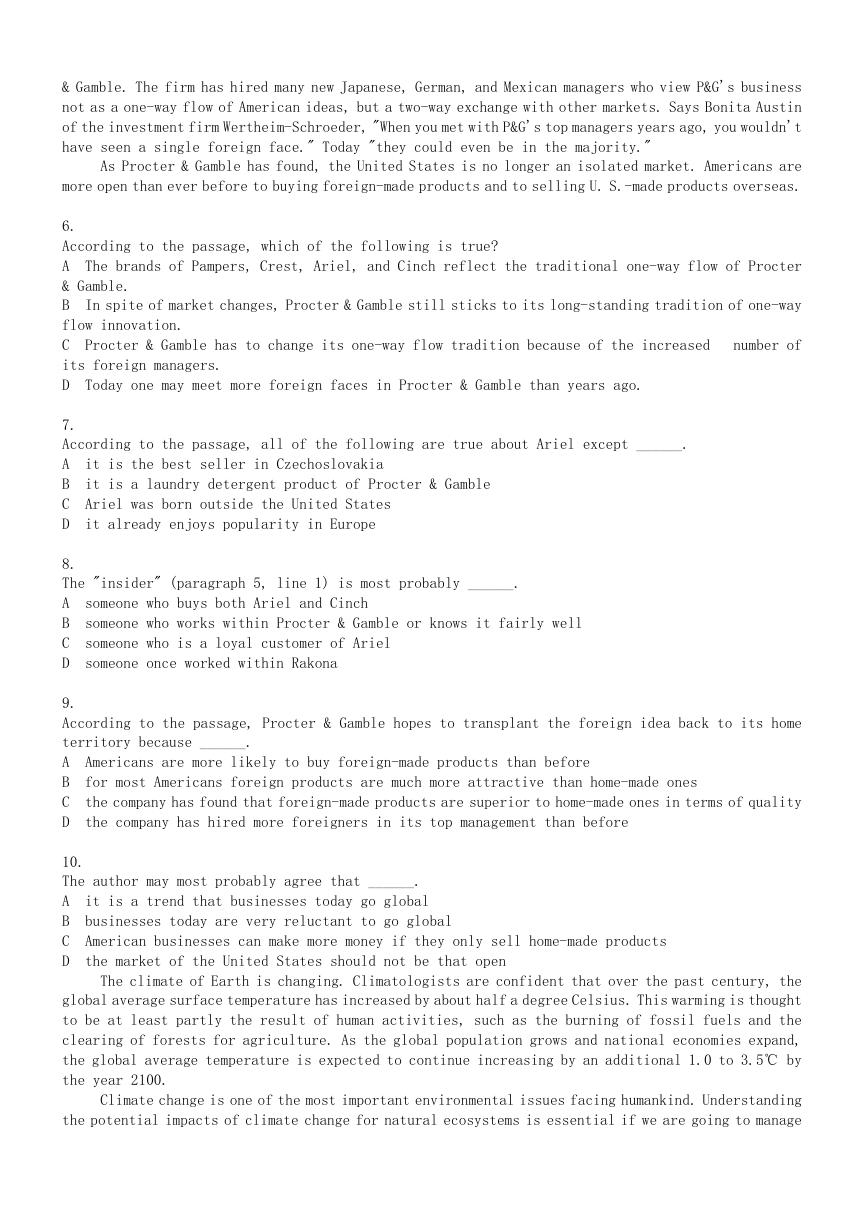
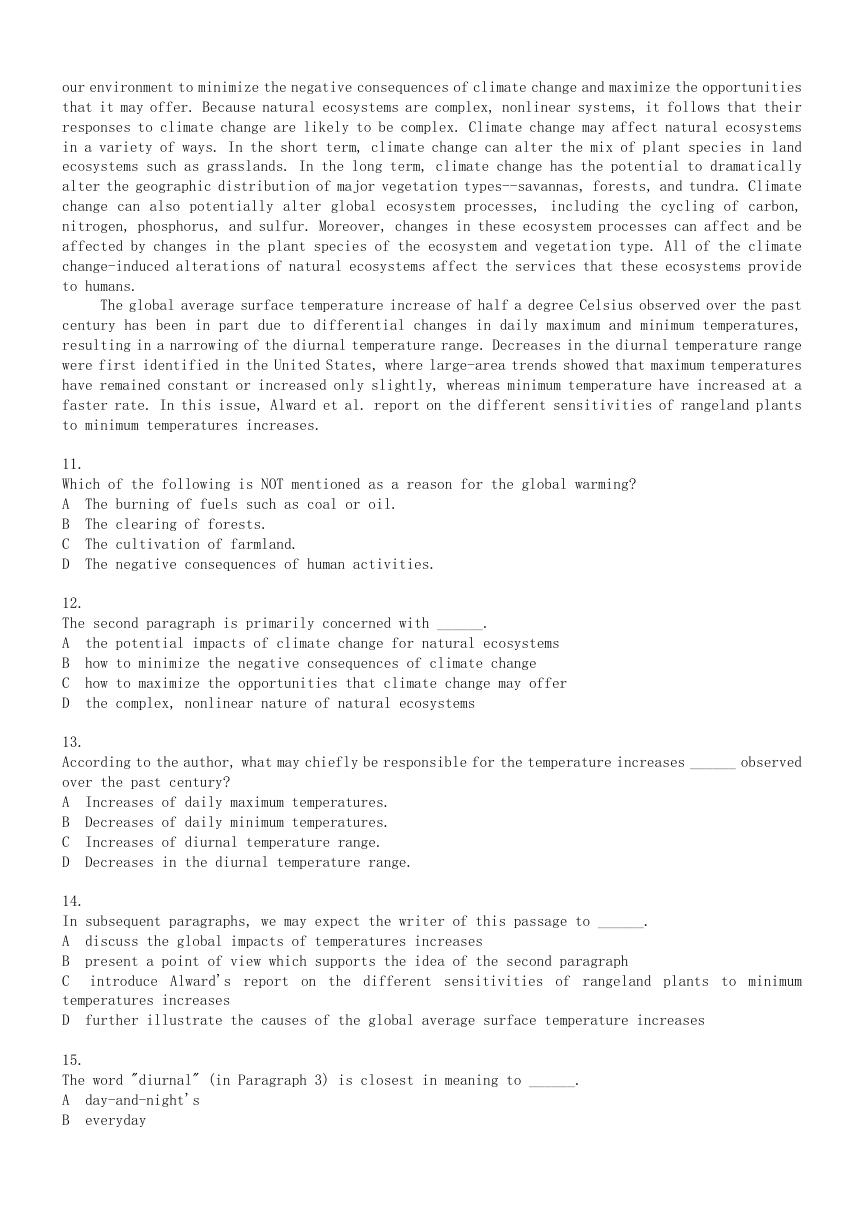
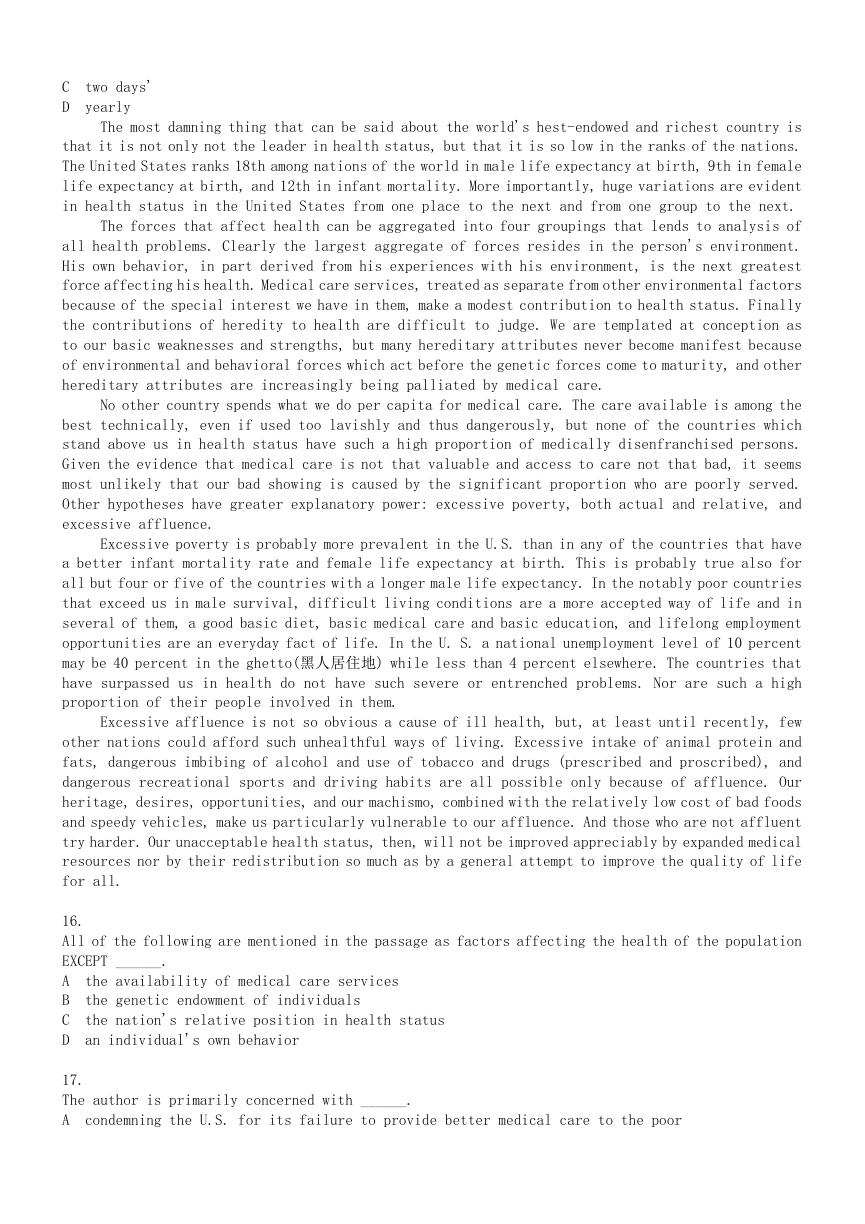
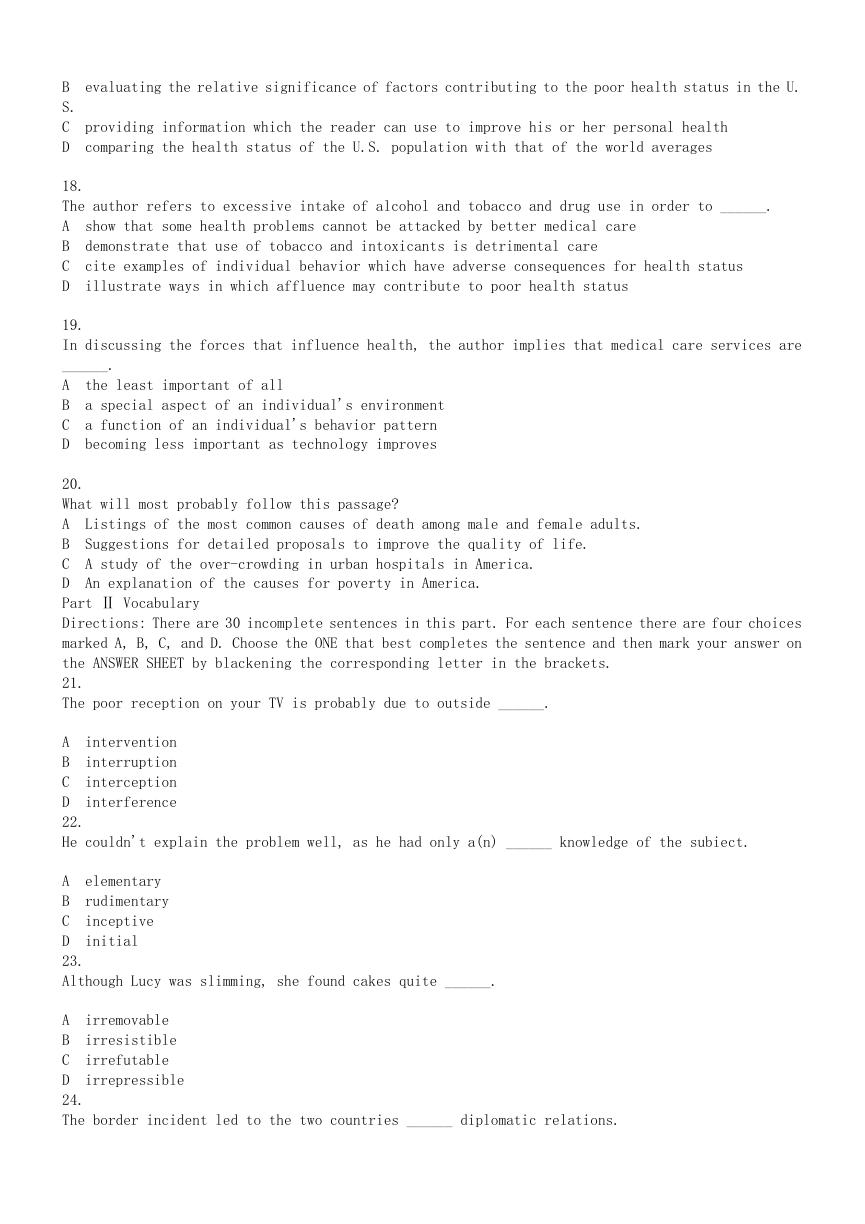

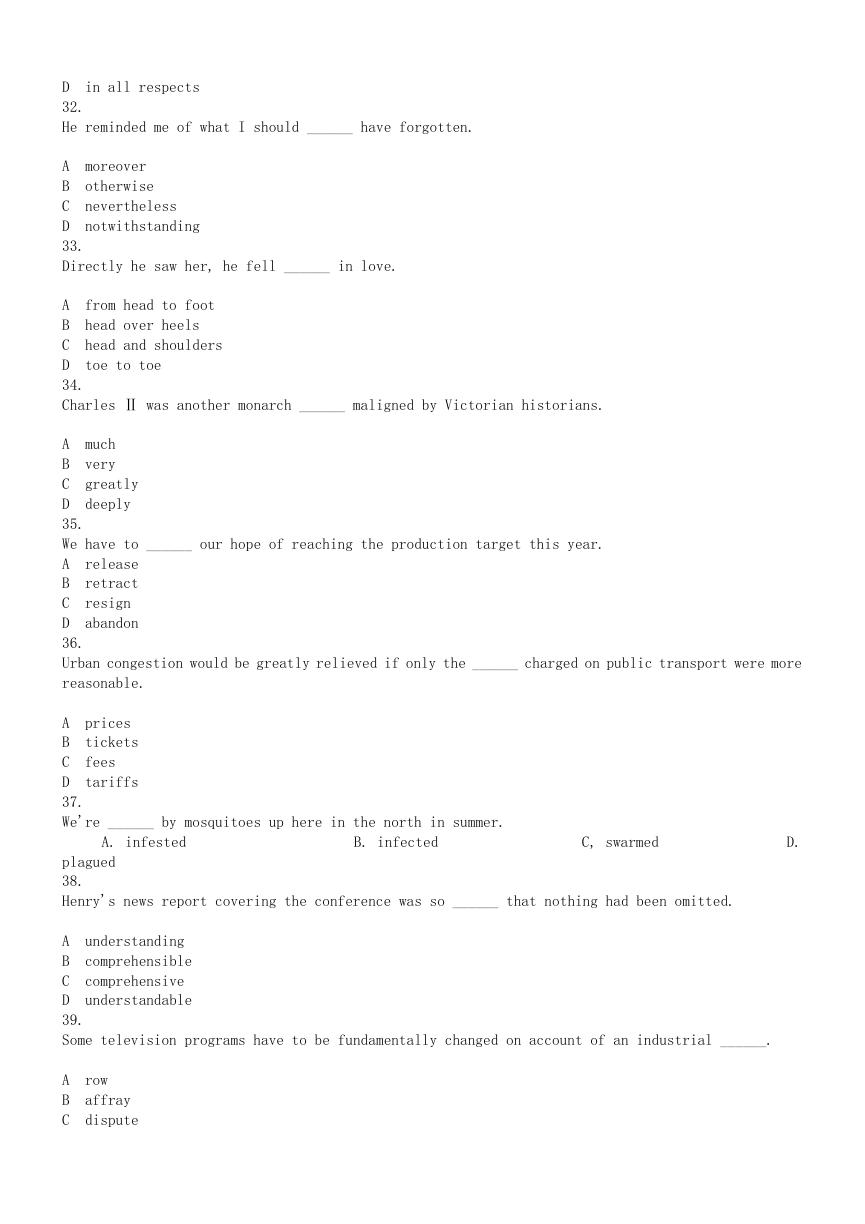








 2023年江西萍乡中考道德与法治真题及答案.doc
2023年江西萍乡中考道德与法治真题及答案.doc 2012年重庆南川中考生物真题及答案.doc
2012年重庆南川中考生物真题及答案.doc 2013年江西师范大学地理学综合及文艺理论基础考研真题.doc
2013年江西师范大学地理学综合及文艺理论基础考研真题.doc 2020年四川甘孜小升初语文真题及答案I卷.doc
2020年四川甘孜小升初语文真题及答案I卷.doc 2020年注册岩土工程师专业基础考试真题及答案.doc
2020年注册岩土工程师专业基础考试真题及答案.doc 2023-2024学年福建省厦门市九年级上学期数学月考试题及答案.doc
2023-2024学年福建省厦门市九年级上学期数学月考试题及答案.doc 2021-2022学年辽宁省沈阳市大东区九年级上学期语文期末试题及答案.doc
2021-2022学年辽宁省沈阳市大东区九年级上学期语文期末试题及答案.doc 2022-2023学年北京东城区初三第一学期物理期末试卷及答案.doc
2022-2023学年北京东城区初三第一学期物理期末试卷及答案.doc 2018上半年江西教师资格初中地理学科知识与教学能力真题及答案.doc
2018上半年江西教师资格初中地理学科知识与教学能力真题及答案.doc 2012年河北国家公务员申论考试真题及答案-省级.doc
2012年河北国家公务员申论考试真题及答案-省级.doc 2020-2021学年江苏省扬州市江都区邵樊片九年级上学期数学第一次质量检测试题及答案.doc
2020-2021学年江苏省扬州市江都区邵樊片九年级上学期数学第一次质量检测试题及答案.doc 2022下半年黑龙江教师资格证中学综合素质真题及答案.doc
2022下半年黑龙江教师资格证中学综合素质真题及答案.doc